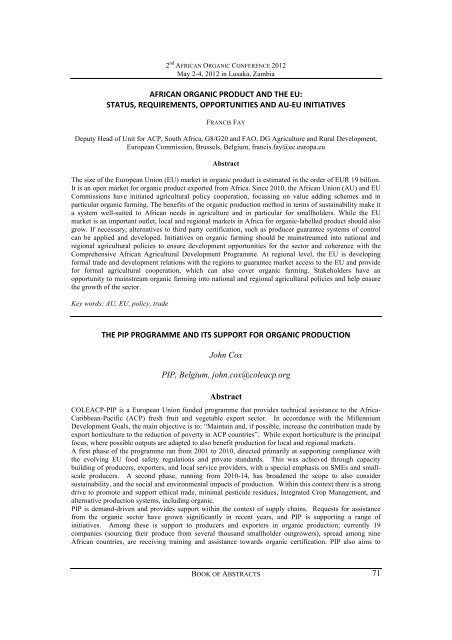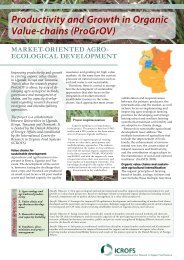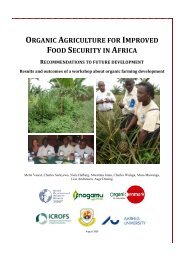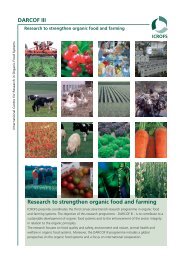The 2nd African Organic Conference â Mainstreaming ... - ICROFS
The 2nd African Organic Conference â Mainstreaming ... - ICROFS
The 2nd African Organic Conference â Mainstreaming ... - ICROFS
You also want an ePaper? Increase the reach of your titles
YUMPU automatically turns print PDFs into web optimized ePapers that Google loves.
2 nd AFRICAN ORGANIC CONFERENCE 2012<br />
May 2-4, 2012 in Lusaka, Zambia<br />
AFRICAN&ORGANIC&PRODUCT&AND&THE&EU:&<br />
STATUS,&REQUIREMENTS,&OPPORTUNITIES&AND&AU:EU&INITIATIVES&<br />
FRANCIS FAY<br />
Deputy Head of Unit for ACP, South Africa, G8/G20 and FAO, DG Agriculture and Rural Development,<br />
European Commission, Brussels, Belgium, francis.fay@ec.europa.eu<br />
Abstract<br />
<strong>The</strong> size of the European Union (EU) market in organic product is estimated in the order of EUR 19 billion.<br />
It is an open market for organic product exported from Africa. Since 2010, the <strong>African</strong> Union (AU) and EU<br />
Commissions have initiated agricultural policy cooperation, focussing on value adding schemes and in<br />
particular organic farming. <strong>The</strong> benefits of the organic production method in terms of sustainability make it<br />
a system well-suited to <strong>African</strong> needs in agriculture and in particular for smallholders. While the EU<br />
market is an important outlet, local and regional markets in Africa for organic-labelled product should also<br />
grow. If necessary, alternatives to third party certification, such as producer guarantee systems of control<br />
can be applied and developed. Initiatives on organic farming should be mainstreamed into national and<br />
regional agricultural policies to ensure development opportunities for the sector and coherence with the<br />
Comprehensive <strong>African</strong> Agricultural Development Programme. At regional level, the EU is developing<br />
formal trade and development relations with the regions to guarantee market access to the EU and provide<br />
for formal agricultural cooperation, which can also cover organic farming. Stakeholders have an<br />
opportunity to mainstream organic farming into national and regional agricultural policies and help ensure<br />
the growth of the sector.<br />
Key words: AU, EU, policy, trade<br />
THE&PIP&PROGRAMME&AND&ITS&SUPPORT&FOR&ORGANIC&PRODUCTION&<br />
John Cox<br />
PIP, Belgium, john.cox@coleacp.org<br />
Abstract<br />
COLEACP-PIP is a European Union funded programme that provides technical assistance to the Africa-<br />
Caribbean-Pacific (ACP) fresh fruit and vegetable export sector. In accordance with the Millennium<br />
Development Goals, the main objective is to: “Maintain and, if possible, increase the contribution made by<br />
export horticulture to the reduction of poverty in ACP countries”. While export horticulture is the principal<br />
focus, where possible outputs are adapted to also benefit production for local and regional markets.<br />
A first phase of the programme ran from 2001 to 2010, directed primarily at supporting compliance with<br />
the evolving EU food safety regulations and private standards. This was achieved through capacity<br />
building of producers, exporters, and local service providers, with a special emphasis on SMEs and smallscale<br />
producers. A second phase, running from 2010-14, has broadened the scope to also consider<br />
sustainability, and the social and environmental impacts of production. Within this context there is a strong<br />
drive to promote and support ethical trade, minimal pesticide residues, Integrated Crop Management, and<br />
alternative production systems, including organic.<br />
PIP is demand-driven and provides support within the context of supply chains. Requests for assistance<br />
from the organic sector have grown significantly in recent years, and PIP is supporting a range of<br />
initiatives. Among these is support to producers and exporters in organic production; currently 19<br />
companies (sourcing their produce from several thousand smallholder outgrowers), spread among nine<br />
<strong>African</strong> countries, are receiving training and assistance towards organic certification. PIP also aims to<br />
BOOK OF ABSTRACTS 71





